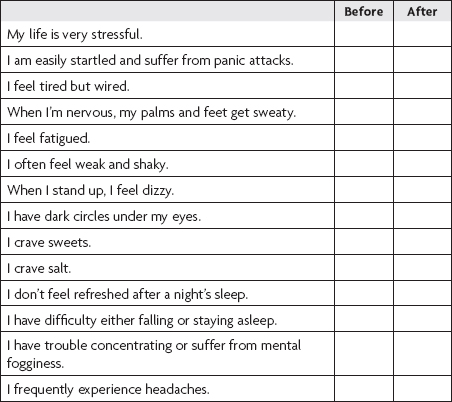

Stress makes you fat and contributes to the development of diabesity. When I worked in the emergency room, I frequently saw patients with high blood sugar. These people were not diabetic. Acute stress had caused their blood sugar to skyrocket. Doctors have long known there is a relationship between stress and blood sugar. What we now understand is that, in the face of chronic stress, our levels of insulin, cortisol, and inflammatory compounds called cytokines all increase. This drives the relentless metabolic dysfunction that leads to weight gain, insulin resistance, and ultimately diabetes.
Rebecca was fifty-two, single, and still lived with and cared for her eighty-four-year-old mother. Despite a highly successful professional career as a social worker, she lived under the cloud of her mother’s daily criticism. The chronic stress affected her ability to care for herself and to make healthy choices about her food, exercise, and social life. Her body secreted high levels of cortisol, which helps protect us from danger in times of acute stress but causes weight gain, increases hunger, causes pre-diabetes and diabetes, and contributes to or exacerbates every known chronic disease. Rebecca developed severe pre-diabetes, but what she most needed wasn’t a healthier diet or more exercise. She needed to get a “mother-ectomy” and move out. With support and encouragement, she reclaimed her life and her health.
Are your stress levels contributing to your diabesity? Take the quiz below to find out. Remember to take this quiz before you start the program and again after the six weeks are over to measure the “before and after” change in your health. You may need extra individualized support based on your scores; I explain this in Week 6 of the plan.
Chronic stress contributes to many diseases including diabesity. For any symptom you have experienced in the last month, place a check in the “Before” box. Then find out how severe your problem is by using the scoring key below. Place a check in the “After” box after you’ve completed the six-week program to see how much you’ve improved.

An increased stress response and the resultant high levels of cortisol worsen diabesity, damage your brain, and impair appetite control, making you hungrier and increasing your craving for sugar.
Diabetics have a much higher risk of getting depression.1 And depressed people have a higher risk of getting diabetes. In a major study published in the Archives of Internal Medicine,2 scientists found that women who were depressed were 17 percent more likely to develop diabetes even after the researchers adjusted for other risk factors such as weight and lack of regular exercise. Those women who were taking antidepressants were 25 percent more likely to develop diabetes than their counterparts who were not depressed. Women who already had diabetes were 29 percent more likely to develop depression after taking into account other depression risk factors, and those women who took insulin for their diabetes were 53 percent more likely to develop depression during the 10-year study. More insulin triggered more depression.
While certain factors such as inflammation, toxins, lack of physical activity, and obesity may partially explain the link between depression and diabetes, they do not completely explain it. They may also be linked by stress. People who are depressed have elevated levels of cortisol, which can lead to problems with glucose or blood sugar metabolism, increased insulin resistance, and the accumulation of belly fat.
As important as this mind-body connection is, it’s still only one part of the puzzle. What most people don’t realize is that what you do to your body affects your brain as well. As your metabolism, insulin resistance, and diabetes improve, you may find that your mood improves dramatically without the help of antidepressants or other drugs. Healing your body is an essential step for healing your brain. My book The UltraMind Solution (www.bloodsugarsolution.com/ultramind-solution) explains how the body affects the brain and how diabesity is linked to mood disorders, cognitive disorders, and brain aging.
The links between stress, weight gain, mental disorders, and blood sugar imbalances show that managing stress is a critical component of obesity and diabetes treatment.
There are many ways to effectively reduce your stress response. You can try relaxation therapies, meditation, breathing exercises, yoga, group support, massage, exercise, saunas, dancing, praying, laughing, and much more. Getting together to get healthy is another powerful way to reduce stress.
Actively engaging your relaxation response is a critical part of the process of healing diabesity. Find a few things you enjoy and do them every day. Relaxing is as important as breathing, sleeping, or eating. Not doing it will kill you. In Part IV, I share a number of extremely effective tools to help you engage your relaxation response. You can try those or my UltraCalm audio program (www.bloodsugarsolution.com/ultracalm).